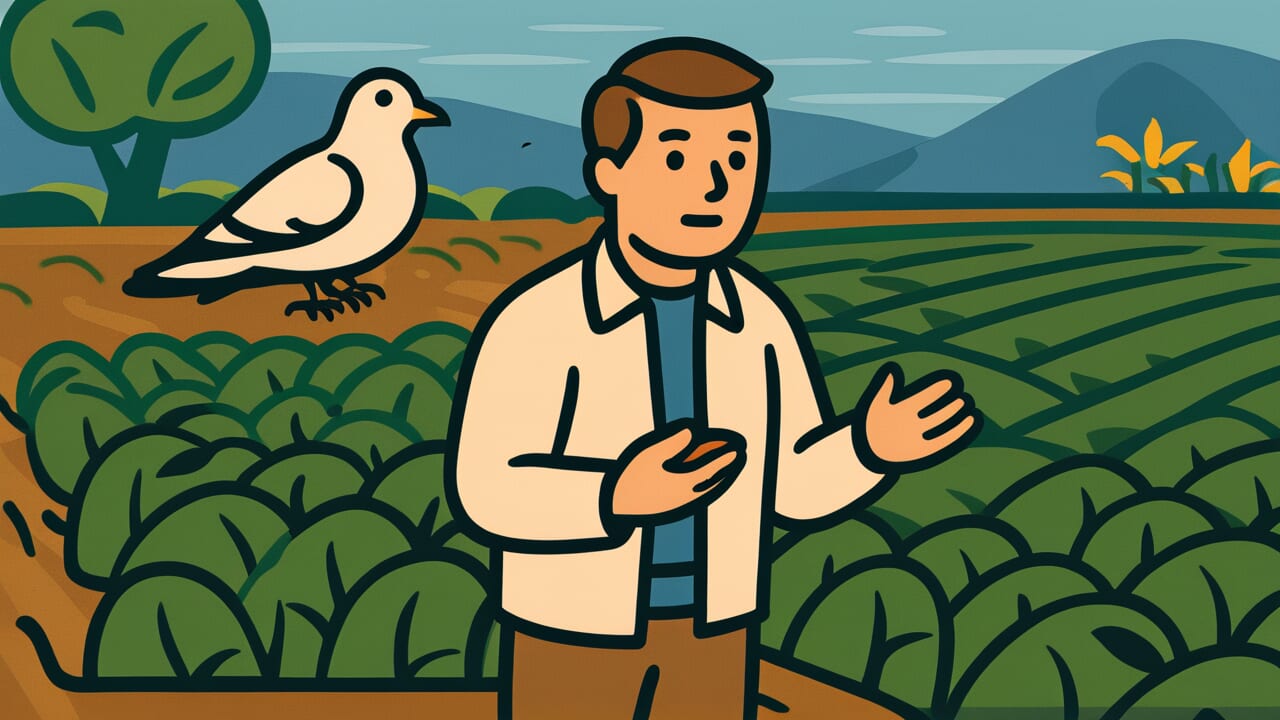How to Read “Hating pigeons, one doesn’t grow beans”
Hato wo nikumi mame wo tsukuranu
Meaning of “Hating pigeons, one doesn’t grow beans”
This proverb warns against putting the cart before the horse. It teaches us not to abandon major benefits or goals just because of small complaints or inconveniences.
Yes, pigeons eating your beans is frustrating. But if you stop growing beans because of that, you lose much more than what the pigeons took.
You give up a rich harvest to avoid a small loss. This is clearly a bad choice.
The proverb applies when people get distracted by minor obstacles or unpleasant elements. They lose sight of their original goals and bigger rewards.
It warns those who throw away their efforts over small frustrations. Even today, it cautions against hasty decisions to quit everything over minor inconveniences or annoying situations.
Origin and Etymology
No clear written records explain this proverb’s origin. However, the phrase itself reveals an interesting background.
Beans were crucial crops in traditional Japanese agriculture. They were nutritious, could be stored long-term, and enriched the soil.
For farmers, beans were both a valuable income source and food supply. But growing beans always attracted pigeons.
Pigeons were troublesome creatures. They ate freshly planted seeds and ripe beans from the fields.
Despite pigeon damage, farmers kept growing beans. Why? Because the benefits of growing beans far outweighed the losses from pigeons.
If farmers stopped growing beans just because they hated pigeons, they would lose great harvests. They would sacrifice major profits to avoid small losses.
This proverb likely emerged from rural wisdom. It warns against the foolishness of getting caught up in small inconveniences and losing sight of true purposes and major benefits.
It’s a highly practical teaching born from daily life.
Interesting Facts
The pigeons in this proverb weren’t completely harmful to farmers. Yes, pigeons ate beans.
But they also ate harmful insects from the fields. Their droppings became fertilizer.
In other words, pigeons had both troublesome and beneficial aspects. Knowing this makes the proverb’s lesson feel deeper.
If you reject everything because of small harms, you lose the hidden benefits too. The proverb contains a double warning.
Usage Examples
- He quit his job because he disliked his boss’s nagging. That’s “hating pigeons, one doesn’t grow beans”—he ended up losing out.
- Quitting the hobby you just started because you didn’t like one thing the teacher said? That’s “hating pigeons, one doesn’t grow beans.”
Universal Wisdom
Humans tend to react emotionally to unpleasant events right in front of them. Someone’s words hurt us, small failures discourage us, minor inconveniences irritate us.
At such times, we often focus only on removing that discomfort.
This proverb has been passed down for generations because it recognizes this fundamental human weakness. When emotions run high, our vision narrows.
We can’t see our original purpose or major benefits. Resolving immediate frustrations seems like the only thing that matters.
Interestingly, this behavior pattern is a kind of self-defense mechanism. The psychology of “I don’t want to get hurt anymore” or “I don’t want unpleasant experiences” makes us want to escape.
But ironically, that escape ends up robbing us of our own potential and benefits.
Our ancestors found this psychological trap in everyday rural scenes. The importance of wisdom to stay calm and see the whole picture without being swept by emotions.
This remains a universal truth as long as humans are human, no matter how times change.
When AI Hears This
Stopping bean cultivation because you hate pigeons eating them is falling into what game theory calls a “Nash equilibrium trap.”
You try to counter the other party’s actions, but end up at the worst equilibrium point where nobody benefits.
What’s interesting is that quantifying this situation clearly shows its self-destructive nature. Suppose you grow 100 beans, pigeons eat 20, and you keep 80.
But if you hate pigeons and stop growing beans, you have zero. 80 versus zero.
It’s clearly a loss, yet humans have such strong negative emotions about “not wanting to give the other party benefits” that they throw away their own benefits too.
Behavioral economist Dan Ariely’s experiments show that people will throw away their own $2 to prevent someone else from gaining $1.
In other words, the human brain is designed to prioritize “relative loss avoidance” over “absolute benefit acquisition.”
We see the same structure in modern society. Companies cancel new product development fearing social media backlash. Schools cancel events to avoid complaints.
These are all examples of “hatred of pigeons” destroying the original purpose of “growing beans.” Small external threats stop large internal value creation.
This irrationality may be the biggest blind spot in human decision-making.
Lessons for Today
What this proverb teaches modern you is “the courage to accept imperfection.” Perfect environments, perfect relationships, perfect jobs—none of these exist.
Every situation comes with small inconveniences like pigeons.
What matters is weighing those inconveniences against your original purpose and judging calmly. There’s someone difficult at work, studying gets boring sometimes, there’s someone you don’t click with in your hobby group.
But are these reasons to stop growing beans? What do you really want to gain?
Modern society offers many choices. When something unpleasant happens, you can easily choose another path.
But this convenience might actually be weakening us. If you develop a habit of giving up easily over small complaints, you can’t obtain truly valuable things.
Please don’t get too distracted by the small pigeons in front of you. Look again at the value of the beans you’re trying to grow.
That’s where your future lies.



Comments